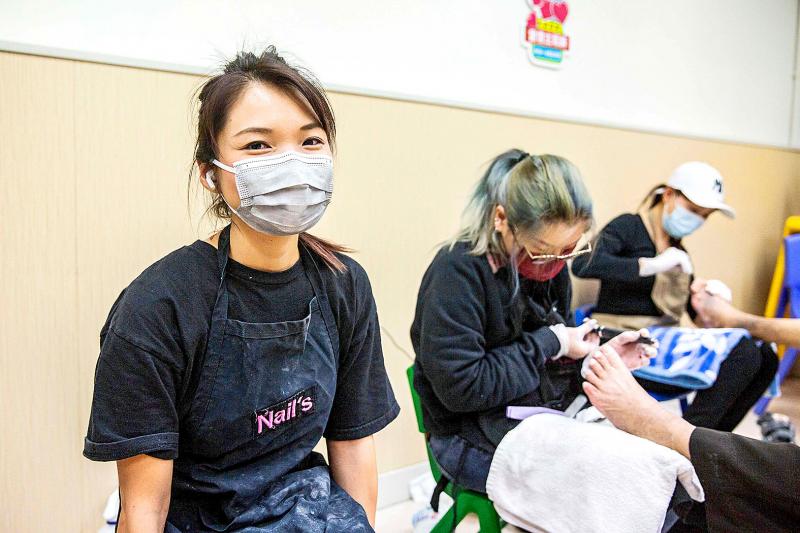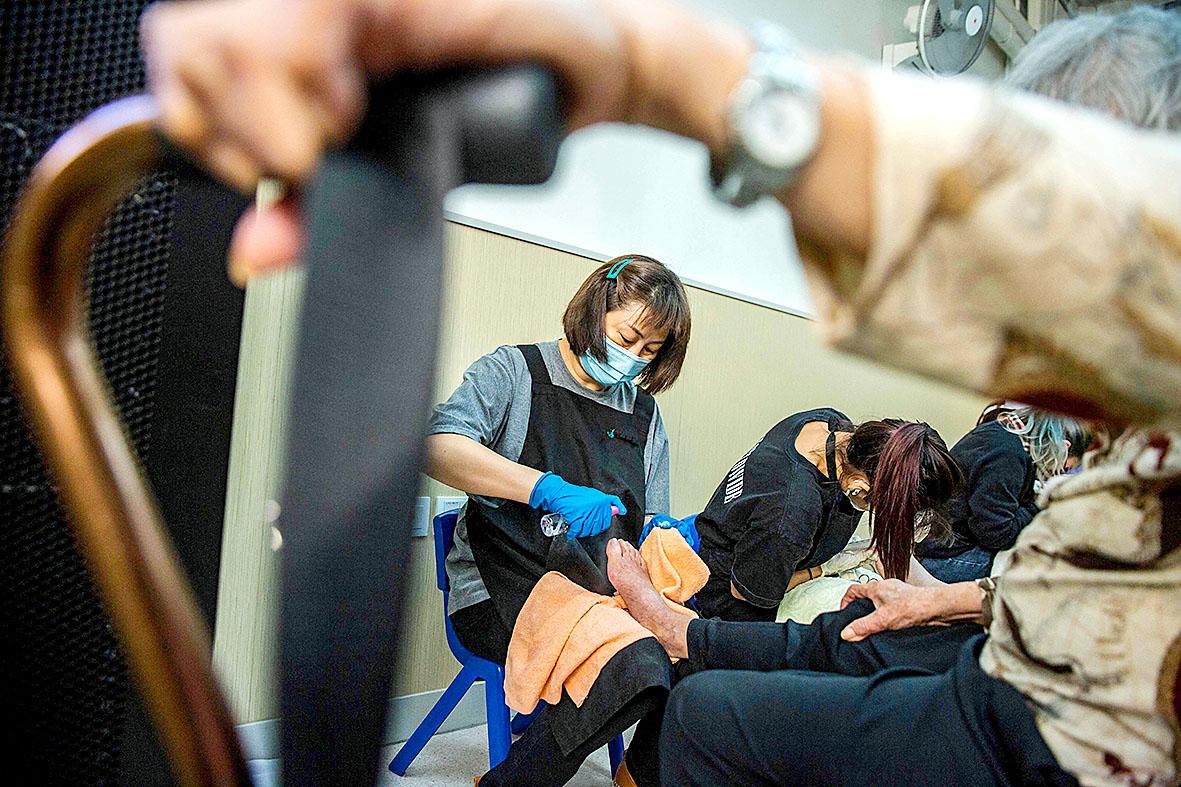Gently unwrapping clingfilm covering the old man’s damaged feet — skin darkened and cracked, nails lumpen and deformed — the Hong Kong beautician doesn’t flinch. Instead she picks up her tools and starts working.
Once to twice a month, Cass Ng and her team of beauticians swap out their nail polish collection for tough scissors, nail files, an electric drill.
Her initiative CHANGE (Caring Health Anywhere Nails Goal Elderly) offers free pedicures for low-income elderly people who cannot afford healthcare and do not have family to fall back on.

Photo: AFP
“We want to serve these people the most because they lack others’ love the most,” the 37-year-old said.
After three years of giving volunteer manicures, Ng was inspired to start her own social enterprise to help those — often over 65 and on social benefits — unable to afford the city’s expensive private healthcare.
While Hong Kong has a public healthcare system, many complain they have to wait for long periods to be seen with various ailments getting worse.

Photo: AFP
One of those visiting Ng’s free clinic for the first time was Martin Sun, 71, who said he had been troubled by ingrowing toenails and fungal infections for years.
He describes that day’s treatment, a full pedicure, as a blessed relief.
“If not, I would do it myself, bend down, then take a deep breath, and endure the pain,” he said of trying to do the same work himself.
Kwan Lung, 86, gave a thumbs up and beamed during her visit to the clinic at the Kwai Chung community center.
“The more they (the manicurists) come, the happier we old people are,” the grandmother explained.
She described “sweating like it’s raining” when she tried her own pedicures before.
Although the day seems light-hearted, Ng explains, when the elderly don’t treat their fungal nail infections — the most common problem — they can face difficulties walking.
“Slowly, they might tend not to go out and they will become lonelier,” she said. “If the nails are fixed, they feel more comfortable with their feet and can... take a walk and chat with friends.” “When you manicure, the smell and level of dirtiness are very difficult to accept,” she said, describing how difficult it was to help one man who was particularly filthy.
“But after half a year to a year, his situation has changed,” she said. Ng said: “This service should not be just a small thing in community centres, but a service that might be needed by people from all Hong Kong,” adding that she hoped everyone could one day be set on equal footing.

May 11 to May 18 The original Taichung Railway Station was long thought to have been completely razed. Opening on May 15, 1905, the one-story wooden structure soon outgrew its purpose and was replaced in 1917 by a grandiose, Western-style station. During construction on the third-generation station in 2017, workers discovered the service pit for the original station’s locomotive depot. A year later, a small wooden building on site was determined by historians to be the first stationmaster’s office, built around 1908. With these findings, the Taichung Railway Station Cultural Park now boasts that it has

Wooden houses wedged between concrete, crumbling brick facades with roofs gaping to the sky, and tiled art deco buildings down narrow alleyways: Taichung Central District’s (中區) aging architecture reveals both the allure and reality of the old downtown. From Indigenous settlement to capital under Qing Dynasty rule through to Japanese colonization, Taichung’s Central District holds a long and layered history. The bygone beauty of its streets once earned it the nickname “Little Kyoto.” Since the late eighties, however, the shifting of economic and government centers westward signaled a gradual decline in the area’s evolving fortunes. With the regeneration of the once

In February of this year the Taipei Times reported on the visit of Lienchiang County Commissioner Wang Chung-ming (王忠銘) of the Chinese Nationalist Party (KMT) and a delegation to a lantern festival in Fuzhou’s Mawei District in Fujian Province. “Today, Mawei and Matsu jointly marked the lantern festival,” Wang was quoted as saying, adding that both sides “being of one people,” is a cause for joy. Wang was passing around a common claim of officials of the People’s Republic of China (PRC) and the PRC’s allies and supporters in Taiwan — KMT and the Taiwan People’s Party — and elsewhere: Taiwan and

Even by the standards of Ukraine’s International Legion, which comprises volunteers from over 55 countries, Han has an unusual backstory. Born in Taichung, he grew up in Costa Rica — then one of Taiwan’s diplomatic allies — where a relative worked for the embassy. After attending an American international high school in San Jose, Costa Rica’s capital, Han — who prefers to use only his given name for OPSEC (operations security) reasons — moved to the US in his teens. He attended Penn State University before returning to Taiwan to work in the semiconductor industry in Kaohsiung, where he